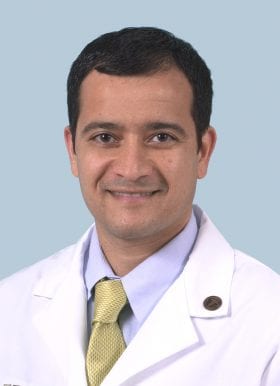
Rajendra Apte, MD, PhD
Paul A. Cibis Distinguished Professor of Ophthalmology and Visual Sciences
Department of Ophthalmology and Visual Science
- Email: apte@nospam.vision.wustl.edu
Awards:
- Carl Camras Translational Research Award
- Sybil B. Harrington Physician-Scientist Award for Macular Degeneration
Mechanisms of Retinal Degeneration and Regeneration
Research in the Apte Lab centers on the study of genetic and immune factors that contribute to cell death, degeneration, and neovascularization in the retina. In particular, they are interested in 1) how aging-related changes in macrophages caninfluence vascularization in age related macular degeneration, 2) how oxidative stress can impact retinal pigmented epithelial cells and contribute to blindness, and 3) the mechanisms of photoreceptor cell death in anima models of disease. Overall, Dr. Apte aims to marry clinically-driven basic research with his clinical practice.
Selected publications
- Ban N, Lee TJ, Sene A, Choudhary M, Lekwuwa M, Dong Z, Santeford A, Lin JB, Malek G, Ory DS, Apte RS. (2018). Impaired monocyte cholesterol clearance initiates age-related retinal degeneration and vision loss. JCI Insight, 3. pii: 120824.
- Ban N, Lee TJ, Sene A, Dong Z, Santeford A, Lin JB, Ory DS, Apte RS. (2018). Disrupted cholesterol metabolism promotes age-related photoreceptor neurodegeneration. J Lipid Res. 59(8):1414-1423.
- Lin JB, Kubota S, Ban N, Yoshida M, Santeford A, Sene A, Nakamura R, Zapata N, Kubota M, Tsubota K, Yoshino J, Imai SI, Apte RS. (2016). NAMPT-Mediated NAD(+) Biosynthesis Is Essential for Vision In Mice. Cell Rep. 17(1):69-85.